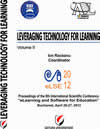GBL AND CREATIVITY IN CLASSES
GBL AND CREATIVITY IN CLASSES
Author(s): Bogdan Logofătu, Anișoara Dumitrache, Beatrice AlmăşanSubject(s): Education
Published by: Carol I National Defence University Publishing House
Keywords: Creativity; LLP sub-programmes; GBL; co-design
Summary/Abstract: The aim of this paper is to present the results obtained during ProActive project, a European project having as main objective the creation of learning contexts in which educators (teachers, professors, trainers) of different LLP sub-programmes (Comenius, Leonardo da Vinci and Erasmus) can an apply their creativity in designing their own GBL scenarios using digital tools (two games editors: Eutopia and <e-Adventure>). In order to identify project’s potential in developing educational games, in the first phase of the project were organized several focus groups with teachers, trainers and professors according to an initial project plan. The results obtained helped the team to adapt the two game editors according to the users’ needs. In a second phase, University of Bucharest has selected three pilot sites representing centers, associations, institutions that offer courses in different fields: from computer skills and advanced computer networks to personal development and outdoor education were selected to be part of implementation phase. The selection process was made according with specific criteria related to their experience in the field and institutions’ interests to use Game Based Learning in their current practice. Through co-design sessions and workshops participants learned how to use the tools for creating games, and how to integrate these computer aided instruction sequences in a regular classroom. Through Game Based Learning, trainers will improve their teaching methods, transforming classes in spaces for collaborative work, participation, problem solving. Game Based Learning will encourage students to continue their work at home and to communicate with other colleagues and trainer even if the learning scenarios are applied in traditional learning, in blended learning, or in distance learning.
Journal: Conference proceedings of »eLearning and Software for Education« (eLSE)
- Issue Year: 8/2012
- Issue No: 02
- Page Range: 325-330
- Page Count: 6
- Language: English

